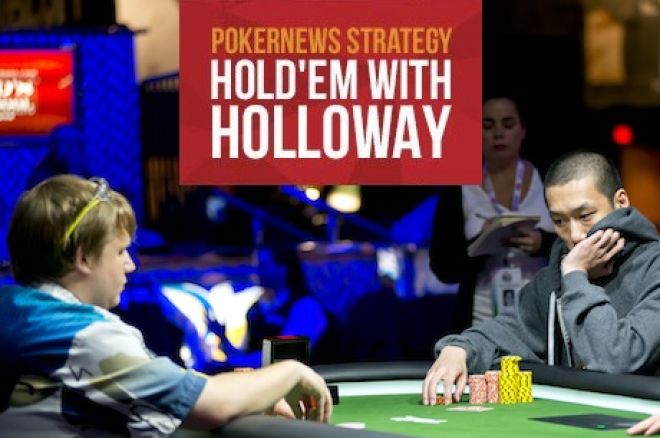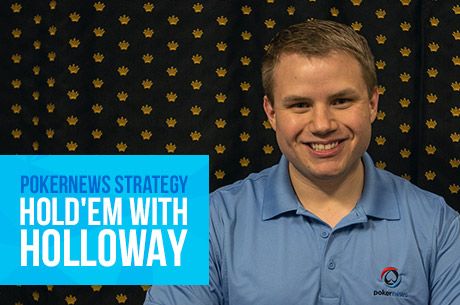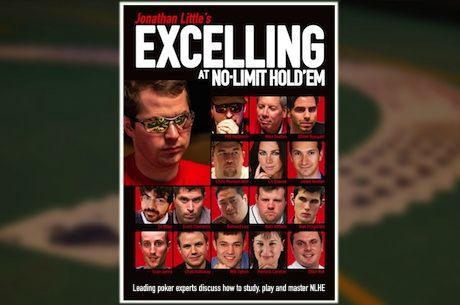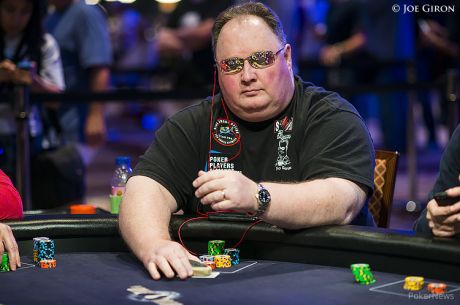Hold��em with Holloway, Vol. 23: When It Comes to Chops, Do What��s In Your Best Interest

At the 2013 World Series of Poker, Team PokerStars Pro Jason Mercier gave me a nickname on Twitter while sweating me heads up at the final table of Event #1: $500 Casino Employees No-Limit Hold��em �� ��No Chop Chad.��
The story behind it is simple. My opponent, Allan Kwong, and I took an impromptu break to talk about a chop. The WSOP doesn��t allow chopping, but many players strike deals behind the scenes. The difference between first and second was more than $32,000, which was a lot of money for us both. I had the chip lead at the time, so I was in a good spot for a favorable deal.
In fact, we came very close to striking one, but then I decided it wasn��t in my best interest to do so. What led me to that decision?
For as long as I could remember, I��d always dreamed of capturing a WSOP bracelet. That summer, only one player stood between me and realizing that dream. During our conversation, Allan said something along the lines of ��you take X amount, I��ll take X amount, and then we can just flip for the bracelet.�� That was the moment I knew I couldn��t strike a deal.
The money was nice, but the bracelet had a great deal of value in my eyes. For me, it would be validation of the life I��ve chosen to lead. My read was that the money was what mattered most to Allan, and if I took that pressure off him, he wouldn��t play his normal game. In other words, with just the bracelet on the line (which I doubt he cared about as much as me), he might have become a wild man. I had to keep him playing his game, which meant there needed to be money to play for to keep him in line.
What��s more, I wanted to win legitimately. I probably could have worked a deal in which I gave up some cash and got the bracelet, but as tempting as that was, I couldn��t do it. I didn��t want a WSOP bracelet knowing that I had to work a deal to get it. No, I was going to win it or lose it on my own accord, and if the latter happened, at least I��d be able to live with that. Fortunately things went my way, and today I��m (obviously) thankful I made the decision I did.
Now, while I didn��t chop in that particular instance, I��m not opposed to doing so if the circumstances are right. One tournament where I did chop was back at the 2011 WSOP Circuit Harrah��s St Louis stop in a $235 Limit Omaha High event. The tournament only attracted 40 players, which created a prize pool of $6,940 that was to be distributed only to the top four finishers. When we made the final table, many of the remaining nine players wanted to work a chop.
Since one player was extremely short, I immediately turned down the idea, which of course upset a few people. Even so, I knew it was the best +EV decision, so I made it. Once the short-stacked player busted, the other players wanted to revisit the idea. At this point I was third in chips, but the blinds were high. Pretty much every hand was upsetting the balance of the game. I declined again, but they insisted I at least consider a chop, no matter how outrageous it may be.
I consulted with the two chip leaders, and together we came up with an wild deal that would see the three of us walk away with equal paydays of $1,800, the player fourth in chips (who wasn��t too far behind me) get $1,000, two other players something like $500, and the two extreme short stacks their $235 buy-in back.
Why anyone in their right mind would take that deal, I don��t know, but they did. How could two people, who had played for seven hours up to that point, be satisfied only to get their buy-ins back? Why even play in the first place? It didn��t make sense, but since I was essentially able to lock up second-place money with eight players left, I took the deal.
Oftentimes the other players will try to peer pressure you into a chop �� like they did to me in St. Louis --- but I recommend you never let this influence your decision. If anything, turn it to your advantage. You know they��re anxious to chop, so use that as leverage when negotiating. If you can work a deal that is clearly in your favor, then do the smart thing and lock up the free money.
Just remember, other players can play hardball, too, and in such instances you��d better be willing to stand your ground and play it out. Also, if you��re ever able to work a chop where you stand to get more than first-place money �� like Dan Smith famously did in the Sunday Million a couple of years back �� you��d better snap it up in a heartbeat. Likewise, don��t ever be a part of a chop where someone gets more than first-place money, as that��s just absurd. Anything can happen at a final table, and sometimes the risk is worth taking.
Get all the latest PokerNews updates on your social media outlets. Follow us on Twitter and find us on both Facebook and Google+!
In this Series
- 1 Hold��em with Holloway, Vol. 1: Making Reads and Trusting Them
- 2 Hold��em with Holloway, Vol. 2: Playing in Poker Charity Events
- 3 Hold��em with Holloway, Vol. 3: Throttle Back Before You End Up Punting
- 4 Hold��em with Holloway, Vol. 4: Punish the Satellite Bubble
- 5 Hold��em with Holloway, Vol. 5: What is Proper Accumulator Strategy?
- 6 Hold��em with Holloway, Vol. 6: A Chip and a Chair Story with ��SirWatts��
- 7 Hold��em with Holloway, Vol. 7: 15 Things About Poker I Wish I��d Known Sooner
- 8 Hold��em with Holloway, Vol. 8: Examining the Largest Overlay in Poker History
- 9 Hold��em with Holloway, Vol. 9: Differences Between Rebuys and Reentries
- 10 Hold��em with Holloway, Vol. 10: Five Must-Read Poker Books of 2014
- 11 Hold��em with Holloway, Vol. 11: When Will You Finally Break Through?
- 12 Hold��em with Holloway, Vol. 12: Dealing with a Target on Your Back
- 13 Hold��em with Holloway, Vol. 13: Knowing When to Call It Quits
- 14 Hold��em with Holloway, Vol. 14: Embarking on a Year-Long Weight Loss Journey
- 15 Hold��em with Holloway, Vol. 15: Navigating Multiple Decision Points in a Poker Hand
- 16 Hold��em with Holloway, Vol. 16: Chris Moorman Tells Me How Badly I Play Poker
- 17 Hold��em with Holloway, Vol. 17: Richard ��nutsinho�� Lyndaker on Getting It in Marginal
- 18 Hold��em with Holloway, Vol. 18: Getting Inside the Head of Poker Pro Brian Rast
- 19 Hold��em with Holloway, Vol. 19: Stupid Calls & Lucky Draws in MSPT WI Championship
- 20 Hold��em with Holloway, Vol. 20: Talking Ante-Only Strategy with Greg ��FossilMan�� Raymer
- 21 Hold��em with Holloway, Vol. 21: Contributing to Jonathan Little��s New Book
- 22 Hold��em with Holloway, Vol. 22: Consequences of Acting Out of Turn & Tossing in Chips
- 23 Hold��em with Holloway, Vol. 23: When It Comes to Chops, Do What��s In Your Best Interest
- 24 Hold��em with Holloway, Vol. 24: Accepting Bad Beats & Lessons in Selling Action
- 25 Hold��em with Holloway, Vol. 25: Heinz�� Ace-High Call Shows Why He's a World Champ
- 26 Hold��em with Holloway, Vol. 26: Is Keeping the Short Stack Alive Collusion?
- 27 Hold��em with Holloway, Vol. 27: Great Laydown or Bad Fold on Poker Night in America?
- 28 Hold��em with Holloway, Vol. 28: Calling Hellmuth with Jack-Deuce Offsuit
- 29 Hold��em with Holloway, Vol. 29: The Philosophy of "No-Chop" Chad
- 30 Hold��em with Holloway, Vol. 30: Preparing to Play the World Series of Poker
- 31 Hold��em with Holloway, Vol. 31: Staying on Your Grind at the World Series of Poker
- 32 Hold��em with Holloway, Vol. 32: The Perilous Decision to Call Off with Ace-Queen
- 33 Hold��em with Holloway, Vol. 33: Using Poker Skills in Reality TV Competitions
- 34 Hold��em with Holloway, Vol. 34: Esfandiari Explains How to Recover from Bad Beats
- 35 Hold��em with Holloway, Vol. 35: Tilly vs. Brunson in Super High Roller Cash Game Hand
- 36 Hold��em with Holloway, Vol 36: Unconventional Play Leads to Good WSOP Main Event Start
- 37 Hold��em with Holloway, Vol. 37: Lessons in Pot-Limit Omaha Hi-Low w/ Evan Jarvis
- 38 Hold��em with Holloway, Vol. 38: Things to Say and Do When You Bust a Poker Tournament
- 39 Hold��em with Holloway, Vol. 39: How Much Did I Have to Raise to Get You to Fold?
- 40 Hold��em with Holloway, Vol. 40: Practicing Patience in My Deep PPC Poker Tour Run
- 41 Hold��em with Holloway, Vol. 41: Analyzing a Questionable SHRPO Main Event Hand
- 42 Hold��em with Holloway, Vol. 42: Analyzing the Play of Neymar Jr. at EPT Barcelona
- 43 Hold��em with Holloway, Vol. 43: The Value of a Reliable Poker Reputation
- 44 Hold��em with Holloway, Vol. 44: John ��KasinoKrime�� Beauprez Rips My PLO Game Apart
- 45 Hold��em with Holloway, Vol. 45: Satellite Dilemmas -- To Call or Not to Call
- 46 Hold��em with Holloway, Vol. 46: Seiver Leverages the River in Super High Roller Bowl
- 47 Hold��em with Holloway, Vol. 47: What Untraditional Moves in Poker Might Mean
- 48 Hold��em with Holloway, Vol. 48: Thinking About the Future with Sam Grizzle
- 49 Hold��em with Holloway, Vol. 49: WCOOP Champ ��Coenaldinho7�� Offers Up His Biggest Hands
- 50 Hold��em with Holloway, Vol. 50: The Peril of Shoving Weak Aces
- 51 Hold��em with Holloway, Vol. 51: The Importance of Not Giving Up in Poker Tournaments
- 52 Hold��em with Holloway, Vol. 52: Does Asking ��Check�� Actually Constitute a Check?
- 53 Hold��em with Holloway, Vol. 53: Thomas Cannuli Impresses Even After Main Event Bustout
- 54 Hold��em with Holloway, Vol. 54: Dealers Aren��t Always Right
- 55 Hold��em with Holloway, Vol. 55: Don��t Get Married to Pocket Aces
- 56 Hold��em with Holloway, Vol. 56: Bazeley��s Survival Instinct Leads to Continued Success
- 57 Hold��em with Holloway, Vol. 57: Playing ��Deuces Wild�� on the European Poker Tour
- 58 Hold��em with Holloway, Vol. 58: The Wildest Hand in European Poker Tour History
- 59 Hold��em with Holloway, Vol. 59: Death, Zombies & Spending Time w/Phil Hellmuth
- 60 Hold��em with Holloway, Vol. 60: How the Unstoppable Fedor Holz Managed to Win Again
- 61 Hold��em with Holloway, Vol. 61: Lessons To Be Learned When You Hit the Big Stage
- 62 Hold��em with Holloway, Vol. 62: Steve O��Dwyer Explains the ��Oreo Cookie Tell��
- 63 Hold��em with Holloway, Vol. 63: What Would Happen to a Chip Stack If a November Niner Died?
- 64 Hold��em with Holloway, Vol. 64: Forgetting One Chip -- Should It Still Be an All-In Bet?
- 65 Hold��em with Holloway, Vol. 65: Todd ��sharkslayerrr�� Breyfogle on Bankroll Management
- 66 Hold��em with Holloway, Vol. 66: Cash Game Pro Daniel Arfin Offers Sound Bankroll Advice
- 67 Hold��em with Holloway, Vol. 67: Honeyman Plays Kings to Keep in Opponent��s Bluff Range
- 68 Hold��em with Holloway, Vol. 68: Why Do I Even Bother Drinking at the Poker Table?
- 69 Hold��em with Holloway, Vol. 69: Is Your Favorite Poker Pro Left- or Right-Handed?
- 70 Hold��em with Holloway, Vol. 70: In Order to Live You Have to Be Willing to Die
- 71 Hold��em with Holloway, Vol. 71: How to Amass a Big Stack Early in a Poker Tournament
- 72 Hold��em with Holloway, Vol. 72: Answering User-Submitted Poker Scenarios
- 73 Hold��em with Holloway, Vol. 73: Saying Goodbye with a Top Five List
- 74 Hold'em with Holloway, Vol. 74: We're Back, Baby!
- 75 Hold'em with Holloway, Vol. 75: Jivkov on Exploiting Capped Ranges
- 76 Hold��em with Holloway, Vol. 76: Matt Bretzfield Gets Tricky With Aces
- 77 Hold'em with Holloway, Vol. 77: Joseph Cheong Gets Crazy with a Pair of Ladies
- 78 Hold'em with Holloway, Vol. 78: Wyoming Poker Action & Wild South Dakota Hand
- 79 Hold'em with Holloway, Vol. 79: Calling Controversy at WinStar
- 80 Hold'em with Holloway, Vol. 80: Going for Value with Matt Hunt
- 81 Hold'em with Holloway, Vol. 81: Bracelet Winner Ryan Leng on Bad Call
- 82 Hold'em with Holloway, Vol. 82: Romeopro33 Recounts XL Eclipse Victory
- 83 Hold'em with Holloway, Vol. 83: Men The Master Doesn't Get Paid
- 84 Hold'em with Holloway, Vol. 84: Harman Hits Back-to-Back Miracle Turns
- 85 Hold'em with Holloway, Vol. 85: Jamie Kerstetter on Dealing with Bounties
- 86 Hold'em with Holloway, Vol. 86: Matt Stout Develops a Limp Dynamic
- 87 Hold'em with Holloway, Vol. 87: Matt Alexander Caught in Between w/ Two Red Aces
- 88 Hold'em with Holloway, Vol. 88: John Beauprez on Why He Folded a Set of Jacks
- 89 Hold'em with Holloway, Vol. 89: Alex Aqel Lets Opponent Hang Himself with Aces
- 90 Hold'em with Holloway, Vol. 90: David Peters Makes Beastly Call Against Will Givens
- 91 Hold'em with Holloway, Vol. 91: Poker Lessons from a Game of Risk
- 92 Hold'em with Holloway, Vol. 92: My Upstuck Diagnosis by the CLC Squad
- 93 Hold'em with Holloway, Vol. 93: Alex Foxen Coolers Nick Petrangelo in SHRB
- 94 Hold'em with Holloway, Vol. 94: My $25,000 PSPC Experience at 2019 PCA
- 95 Hold'em with Holloway, Vol. 95: The Equity of Leveraging Time Extensions
- 96 Hold'em with Holloway, Vol. 96: Dan O'Brien on Developing Healthy Routines
- 97 Hold'em with Holloway, Vol. 97: Big Hands From the WSOP-C Potawatomi
- 98 Hold'em with Holloway, Vol. 98: Simon Deadman Rips Apart My NLH Tourney Play
- 99 Hold'em with Holloway, Vol. 99: Shoving 10-6 Smack Dab Into Pocket Aces
- 100 Hold'em with Holloway, Vol. 100: The Revived Re-Entries Debate








